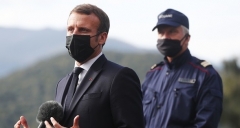
French President Emmanuel Macron visits the border between France and Spain on Thursday. (Photo by Guillaume Horcajuelo/Pool/AFP via Getty Images)
(CNSNews.com) – French President Emmanuel Macron on Thursday called for a tightening of border controls in Europe following deadly Islamist terror attacks in France and Austria, saying the continent’s 35-year-old Schengen agreement – which allows travel between 26 countries without border controls – needs to be overhauled.
“I am in favor … of overhauling Schengen, rethinking its organization, and intensifying our common border security with a proper force at the external borders,” he said while visiting the border between France and Spain.
Macron said he planned to take proposals, designed to curb terror-linked illegal immigration, to a European Union leaders’ summit next month.
In order to “fight effectively against this Islamist terrorism, it is also [necessary] to fight against the networks of traffickers who have links with these terrorists – who sometimes are terrorists themselves – who use drug trafficking and human trafficking to reinforce their actions,” he said.
Macron said France would in the coming days double the number of police officers, gendarmes, and soldiers deployed at its borders with Italy and Spain, from 2,400 to 4,800.
“The attacks that France experienced, that Austria experienced a few days ago in Vienna, show us that the terrorist risk is everywhere, that networks are globalized, that terrorists are now organizing themselves on a global basis – through networks on the one hand, the Internet and social networks, but also by sending agents across borders,” he said.
“This requires Europe to step up its response. France is doing it in terms of its borders, by doubling the forces present. Europe must now do it.”
In late September, a Pakistani stabbed two people in Paris, and in mid-October a Chechen Muslim beheaded a school teacher near the French capital. Two weeks later, a knife-wielding Tunisian terrorist killed three people at a Catholic church in Nice, just hours after entering France from Italy – where he had arrived from Tunisia five weeks earlier.
Early this week, a terrorist killed four people and injured 22 more when he opened fire at various locations in the Austrian capital, Vienna. The gunman, who was shot dead by police, held Austrian and North Macedonian citizenship, was sentenced to 22 months in prison in April 2019 for trying to travel to Syria to join ISIS, but was released early less than eight months later.
Security services in Slovakia earlier warned Austrian authorities that the ISIS sympathizer had traveled to Slovakia to buy ammunition. Austria and Slovakia are both Schengen countries; travel across their common border is not restricted (although some border controls were put in place this year due to the coronavirus pandemic.)
Macron’s proposals, if accepted, could have a significant impact on travel within Europe.
Under the Schengen agreement – first signed in 1985, between just five countries – 26 nations with a combined population of around 419 million people have scrapped visas and passport controls at their common borders. Pre-coronavirus, around 3.5 million people were crossing borders within the zone daily according to E.U. estimates.
The 26 Schengen countries are: Austria, Belgium, Czech Republic, Denmark, Estonia, Finland, France, Germany, Greece, Hungary, Iceland, Italy, Latvia, Liechtenstein, Lithuania, Luxembourg, Malta, Netherlands, Norway, Poland, Portugal, Slovakia, Slovenia, Spain, Sweden, and Switzerland.
All are E.U. member-states except for Iceland, Norway, Switzerland and Lichtenstein. E.U. members that have not signed up to the agreement are Ireland, Romania, Bulgaria, Croatia, and Cyprus.




